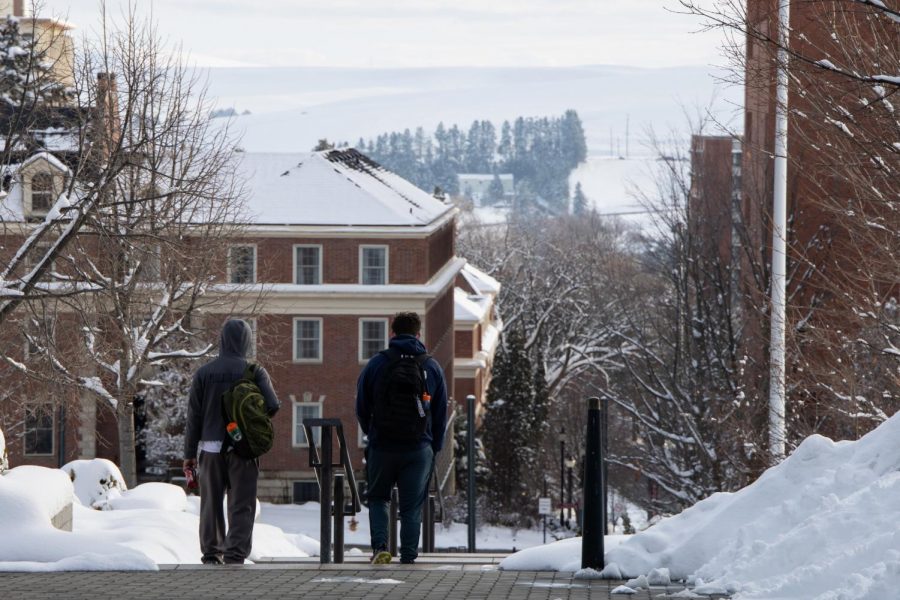- News
- Pullman Community
- TOP FEATURES
- WSU Everett
- WSU Pullman campus
- WSU Spokane
- WSU Tri-Cities
- WSU Vancouver
Parents, students have differing opinions about student loan forgiveness
One parent expects children to pay off loans themselves; another ecstatic about possibility for financial relief
“It’s been really hard on us trying to get them through school with all the expenses,” WSU parent Ginny Hundal-Halpin said. “I’m a single mom, so I’m trying to do what I can, but they’ve had to take out quite a bit of loans to help themselves.”
February 19, 2021
WSU parents and students have mixed feelings about President Joe Biden’s proposed student loan forgiveness plan.
Biden’s plan includes canceling $10,000 in direct federal student loans. The president rejected Senate Majority Leader Chuck Schumer and Senator Elizabeth Warren’s proposal to forgive $50,000 in student loans, according to an article published by ABC News.
WSU parent Mari Bedsaul said she does not believe in loan forgiveness.
“If you sign on to go to a university and accept that cost, then you ultimately should be responsible for paying that money back,” Bedsaul said.
WSU parent Juli LeMaster worked to pay for her college education. LeMaster said she expects her children to figure out how to pay off their loans themselves after graduation.
Jonathan Eagle, plant pathology graduate student, said most economists would agree student loan forgiveness would stimulate the economy, whether it be $10,000 or $50,000.
“The people who want to spend money the most are going to be the people who just come out of college,” Eagle said. “They want to buy a house and they want to do all these things and then they’re strapped down by these student loans and they have to live like college students even after they graduate.”
People who do not have debt are more easily able to move forward with their lives, said Emily Antos, senior human resources and personnel psychology major.
Antos said that she is fortunate enough to not have any student loans, but still supports others who would receive loan forgiveness.
“I think it’s really selfish of people to not want to forgive student loans if they already paid them off,” she said.
Callan Lichtenwalter, Ph.D. animal science candidate, said she does not have loans to pay off but believes loan forgiveness would highly benefit those who do not have financial support from family or scholarships.
Shelly Bradley, WSU parent and administrative assistant for the WSU Office of Commercialization, said she is excited about the possibility of loan forgiveness.
Bradley said loan forgiveness could give students a fair start to their adult life without the massive burden of debt. She and her husband both agree that loan forgiveness should just cover tuition costs and not housing.
Students cannot control what tuition costs. However, they can decide where they live and what their rent budget is, she said.
WSU parent Ginny Hundal-Halpin said she is ecstatic that her sons may receive some financial assistance.
“It’s been really hard on us trying to get them through school with all the expenses,” she said. “I’m a single mom, so I’m trying to do what I can, but they’ve had to take out quite a bit of loans to help themselves.”
Hundal-Halpin said she would be supportive of the idea even if she did not have two children in college.
Students are working hard for their education. She said graduating with massive debt may hinder the start of their adult lives.
Cheryl Cobb, WSU parent and nurse, said she is supportive of student loan forgiveness and believes it could benefit the economy. Cobb has drawn money from her retirement fund to help pay for her daughter’s education.
“I want her to not start off her adulting life with a burden,” she said. “I can’t imagine what it would be like for someone just out of college to be dealing with harassing phone calls and not being able to pay [their student loans] and not have a way out.”






















Carey • Feb 23, 2021 at 11:51 am
My first semester of college was covered by scholarships and grants. I thought it was going to be easy and cheap to go back to school. I had already racked up some debt from a trade school (different issue). I found that going back to school with a growing family was a lot harder than I thought. Tuition increased, bills grew, but the scholarships disappeared and the grants shrunk. I thought I did good by having jobs and limiting the amount of loans. But I was wrong.
I now have a good job/pay, but I can only make the minimum payments. I’ve been out of college for almost twenty years and still have a lot of student loan debt. Add in my wife’s student loans and we don’t see much hope in getting them paid off anytime soon.
I’m not looking for a handout, but I would welcome some assistance. I know people with a lot more debt and have no idea how they handle it. There are a lot of people out there that really need help.
I am so happy and proud that my daughters have managed at WSU fully on scholarships so far. I don’t want them to have the same burden their parents have.
stephen beer • Feb 21, 2021 at 11:30 pm
Two of my children attended and graduated from WSU. They basically paid their own ways by working at multiple odd jobs. Some jobs provided by the University. The experience taught them: the value of delayed gratification, how to shed the cloth of dependency upon parents. It also gave them pride in the personal acknowledgement that by their effort and self-sacrafice they accomplishment a major life goal. And, I think both of these now highly successful people would agree that their University education was more meaningful to them as they “had skin in the game”.